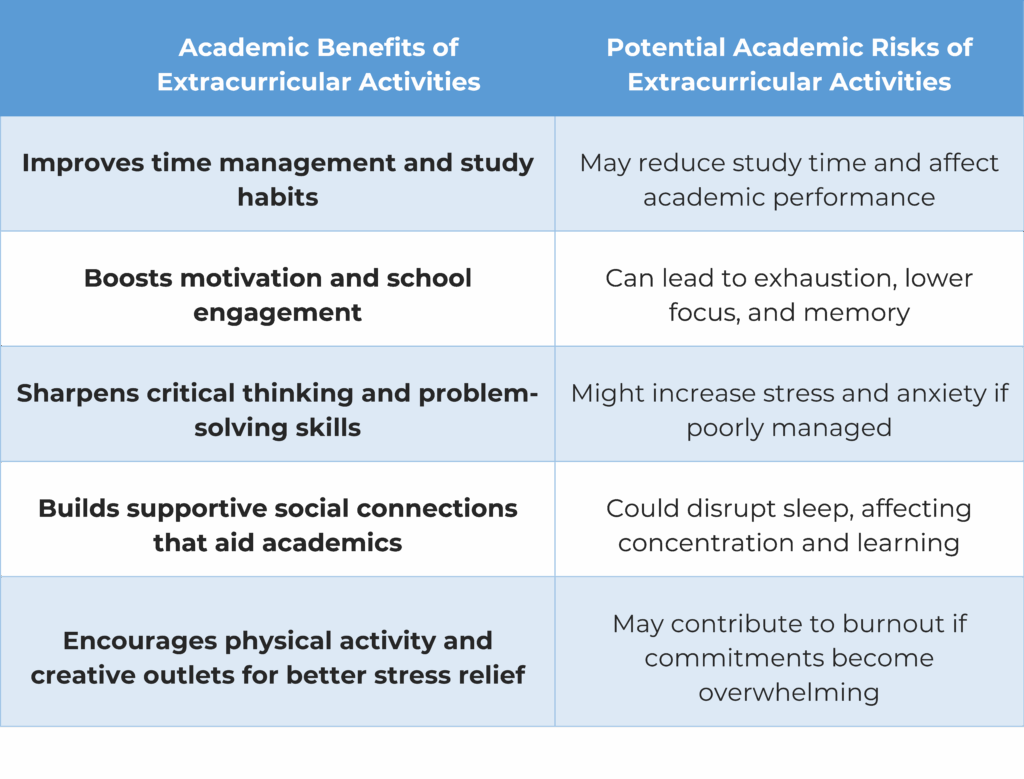Imagine it’s midnight, and you’re staring at math homework while your phone buzzes with messages from your soccer coach about tomorrow’s practice. Your report card needs to impress your parents, you need activities to strengthen your resume for university applications, and you can’t remember the last time you had a full night’s sleep. Sound familiar? Many students around the world are stuck in this exhausting cycle, thinking that top grades and a packed schedule are the only path to success. But the truth is, balancing academics and extracurricular activities doesn’t mean burning out; it means finding a smarter way to manage both.
Why Profile Building Matters in Today’s Market
Profile building is important for students who want to stand out in college admissions and future career opportunities. Universities and employers no longer look at grades alone; they want well-rounded individuals with diverse experiences.
The profile-building activities include:
- Leadership roles in clubs and organisations
- Community service and volunteer work
- Sports participation and athletic achievements
- Creative pursuits like music, art, or writing
- Academic competitions and research projects
- Internships or part-time roles that provide an internship certificate as proof of experience
The benefits of extracurricular activities extend beyond impressive applications. These experiences develop critical life skills, build confidence, and often reveal hidden talents or career interests that shape future paths.
The Academic Pressure: Why Balance Is Non-Negotiable
Academic excellence remains the foundation of student success, but mounting pressure creates serious challenges. Students often sacrifice sleep, social connections, and mental health in pursuit of perfect grades, leading to unsustainable patterns.
Some common reasons students feel overwhelmed are:
- Heavy coursework loads with multiple assignments and exams
- Fear of disappointing parents, teachers, or themselves
- Competitive environments that encourage constant comparison
- Unclear priorities leading to scattered efforts
Warning signs of academic imbalance:
- Declining grades despite increased study time
- Constant fatigue and difficulty concentrating
- Loss of interest in previously enjoyable activities
- Physical symptoms like headaches or sleep problems
Achieving academic balance isn’t just nice to have; it’s essential for long-term success and well-being. Research shows that balanced students perform better academically and develop stronger resilience for future challenges.
How to Start Balancing Academics and Extracurricular Activities
Successfully balancing academics and extracurricular activities requires intentional planning and smart strategies. The key is creating systems that support both areas without overwhelming your capacity.
Set Clear Priorities
Understanding what matters most helps you allocate time and energy effectively. Start by honestly assessing your current situation and future goals.
Essential priority-setting questions:
- What grades do you need to maintain for your future plans?
- Which academic extracurriculars connect directly to your interests?
- Where do you want to be in 1-2 years academically and personally?
- What activities give you energy versus drain you completely?
Define your goals clearly:
- Academic goals: Target GPA, specific course performance, skill development
- Extracurricular goals: Leadership positions, skill building, networking opportunities
Time Management Techniques That Actually Work
Effective time management is essential in achieving a successful balance. These techniques help students maximise productivity without burning out:
- Time blocking: Assign specific time slots for studying, activities, and rest. Treat each block as seriously as a scheduled class.
- Weekly planning: Spend 30 minutes each Sunday reviewing upcoming commitments and planning your week strategically.
- Eisenhower Matrix: Categorise tasks as urgent/important, important/not urgent, urgent/not important, or neither. Focus on important tasks first.
- Digital planners and apps: Use tools like Google Calendar, Notion, or specialised student apps to track deadlines and commitments.
Match Activities to Energy Levels
Smart students recognise their natural energy patterns and plan accordingly. Some people focus better in the morning, while others peak in the evening.
- High-energy activities: Challenging academic work, leadership responsibilities, competitive sports, intense creative projects
- Low-energy activities: Administrative tasks, light reading, casual club meetings, gentle exercise like yoga
Preventing Burnout While Balancing Academics and Sports or Arts
Balancing academics and sports or intensive arts programs requires extra attention to burnout prevention. These demanding activities can boost academic performance when managed well, but they can also overwhelm students who don’t build in proper recovery.
Signs You’re Headed Toward Burnout
- Physical warning signs:
- Constant tiredness despite adequate sleep
- Frequent headaches or muscle tension
- Getting sick more often than usual
- Changes in appetite or sleep patterns
- Emotional and mental indicators:
- Feeling overwhelmed by normal tasks
- Loss of motivation for previously enjoyable activities
- Increased irritability or mood swings
- Difficulty concentrating during study sessions
Incorporate Recovery Time
Recovery isn’t laziness, it’s essential maintenance for peak performance. Students who prioritise rest actually achieve better results than those who push relentlessly without breaks.
Effective recovery strategies:
- Schedule regular breaks between intensive activities.
- Maintain hobbies that don’t relate to academics or structured extracurriculars.
- Prioritise 7-9 hours of quality sleep every night.
- Practice stress-reduction techniques like meditation or gentle exercise.
Talk It Out
Don’t navigate these challenges alone. Speaking with mentors, teachers, or career coaches provides perspective and practical solutions you might not see on your own. Professional career coaching can help you develop personalised approaches for balancing athletics and academics while maintaining your mental health and long-term goals.
How to Choose the Right Academic Extracurriculars
Academic extracurriculars offer unique advantages by directly complementing classroom learning while building your profile. The key is selecting activities that genuinely interest you and support your academic development.
Smart selection criteria:
- Choose activities that connect to your favourite subjects or career interests.
- Consider the time commitment realistically; quality participation matters more than quantity.
- Mix purely academic activities with those that develop different skills.
- Look for opportunities to take on leadership roles as you gain experience.
- Ensure the activity schedule doesn’t conflict with your most important study times.
Popular academic extracurriculars include debate teams, science clubs, academic competitions, research projects, peer tutoring, and subject-specific honour societies.
Do Extracurriculars Really Affect Academic Performance?
The relationship between extracurricular activities and academic achievement is complex and varies for each student. When approached smartly, activities can actually boost academic performance rather than hurt it.

Striking the right balance between academics and extracurriculars takes intention. The right combination can support learning and personal growth, but doing too much can hurt focus, energy, and grades. Check in often to make sure your activities are helping, not holding you back.
Key Takeaways
- Well-managed extracurriculars can support academic performance.
- Overcommitment may affect focus, sleep, and grades.
- Regularly reassess your schedule to avoid burnout.
- Time management and support systems are essential.
- Start with manageable activities and build gradually.
Get personalised career counselling with Mindler to align your academics, interests, and future goals with confidence and clarity.
FAQs
How many extracurricular activities should I participate in?
Focus on 2-3 activities where you can make meaningful contributions and develop leadership skills. Quality involvement matters much more than the total number of activities on your resume.
What if my grades are dropping because of extracurricular commitments?
Immediately reassess your priorities and consider reducing extracurricular involvement temporarily. Your academic foundation must remain strong to support future opportunities.
Can sports actually help my academic performance?
Yes, when properly balanced. Sports offer extracurricular activities benefits like improved time management, discipline, and stress relief, all of which support better academic performance.
How do I know if I’m taking on too much?
Watch for signs like declining grades, constant fatigue, loss of interest in activities you used to enjoy, or feeling overwhelmed by normal daily tasks.
Should I quit activities that don’t directly relate to my career goals?
Not necessarily. Activities that develop transferable skills, provide stress relief, or bring you joy can be valuable even if they’re not career-focused.
How can career coaching help with academic balance?
Professional career coaches help you identify priorities, develop personalised time management systems, and create strategies that align your current activities with long-term goals.








